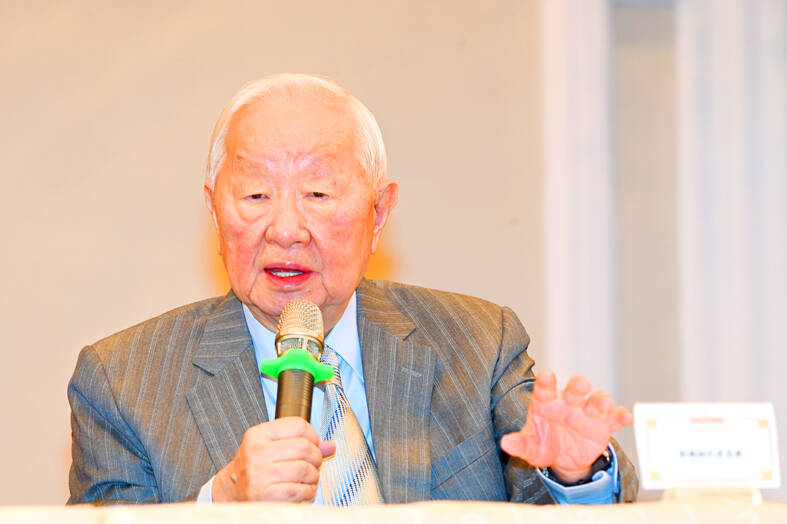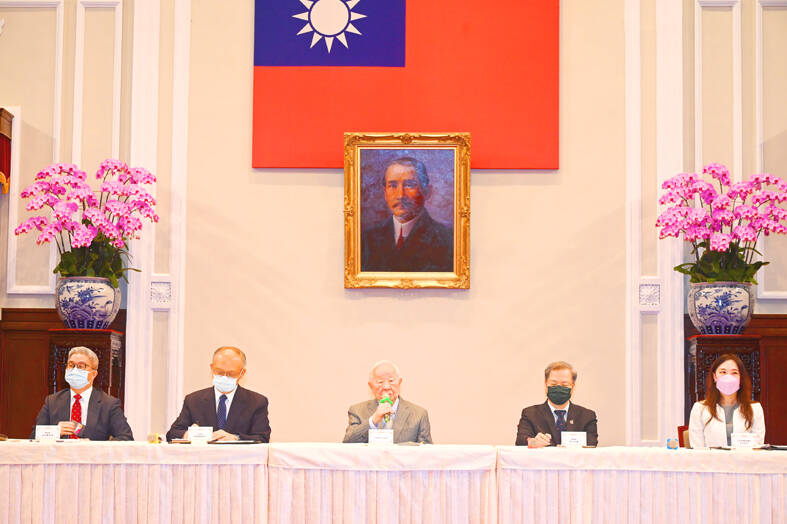Taiwan Semiconductor Manufacturing Co (TSMC, 台積電) founder Morris Chang (張忠謀) yesterday confirmed that the company plans to produce its most advanced 3-nanometer chips in the US as part of the company’s phase 2 plan at its plant in Phoenix, Arizona.
The 91-year-old entrepreneur, who has been appointed as Taiwan’s envoy to APEC six times, yesterday morning held a news conference at the Presidential Office Building to discuss his delegation’s accomplishments at this year’s APEC Economic Leaders’ Week in Bangkok, which ended on Saturday.
He was asked whether TSMC has plans to build advanced chips in the US.

Photo: Tien Yu-hua, Taipei Times
“TSMC’s plant in Arizona is to produce 5-nanometer chips, which comprise the most advanced chip design in the US now, but the company is able to produce 3-nanometer chips, which is its newest technology,” Chang said.
Asked whether TSMC plans to produce 3-nanometer chips in the US, Chang said: “Yes, after it begins producing 5-nanometer chips.”
“The phase 1 plan at the Phoenix plant is to manufacture 5-nanometer chips and the production of 3-nanometer chips would be in phase 2,” he added.

Photo: Tien Yu-hua, Taipei Times
Chang said that he and his wife plan to attend a ceremony in Phoenix on Dec. 6 to launch chip manufacturing at the plant, adding that US President Joe Biden and US Secretary of Commerce Gina Marie Raimondo have been invited to the ceremony.
“We are not sure if President Biden will attend, but the secretary is scheduled to attend the ceremony in Phoenix,” he said.
Representatives from the company’s customers and suppliers, along with US lawmakers, would also be present, Chang said.
Chang was also asked about Dutch chipmaker ASML Holding NV’s plan to operate a semiconductor machinery plant in New Taipei City, and whether it constitutes an example of global diversification in chip production.
“Many countries have only begun to realize that chips are essential products, and envy and admire Taiwan for having such products and technology. During the APEC forum, I was approached by quite a few representatives inquiring about whether TSMC could produce chips in their countries,” Chang said.
He did not say which countries made the inquiries, saying only that “it is impossible for TSMC to have chip production plants in so many different places.”
Reporters also asked Chang about his encounter with Chinese President Xi Jingping (習近平) in Bangkok, where he reportedly congratulated Xi for securing a third term at the Chinese Communist Party’s 20th National Party Congress.
Chang said it was his personal comment and he did not discuss it with the Presidential Office prior to his meeting with Xi.
“The only instruction from the Presidential Office was that I do not have to avoid meeting him [Xi] or greeting him if the opportunity presents itself. As to congratulating President Xi for his achievement at the National Party Congress, that was just my own sentiment,” he said.
National Security Council Deputy Secretary-General Hsu Szu-chien (徐斯儉) said President Tsai Ing-wen (蔡英文) respects the way that Chang chose to interact with Xi.

INVESTIGATION: The case is the latest instance of a DPP figure being implicated in an espionage network accused of allegedly leaking information to Chinese intelligence Democratic Progressive Party (DPP) member Ho Jen-chieh (何仁傑) was detained and held incommunicado yesterday on suspicion of spying for China during his tenure as assistant to then-minister of foreign affairs Joseph Wu (吳釗燮). The Taipei District Prosecutors’ Office said Ho was implicated during its investigation into alleged spying activities by former Presidential Office consultant Wu Shang-yu (吳尚雨). Prosecutors said there is reason to believe Ho breached the National Security Act (國家安全法) by leaking classified Ministry of Foreign Affairs information to Chinese intelligence. Following interrogation, prosecutors petitioned the Taipei District Court to detain Ho, citing concerns over potential collusion or tampering of evidence. The

‘FORM OF PROTEST’: The German Institute Taipei said it was ‘shocked’ to see Nazi symbolism used in connection with political aims as it condemned the incident Sung Chien-liang (宋建樑), who led efforts to recall Democratic Progressive Party (DPP) Legislator Lee Kun-cheng (李坤城), was released on bail of NT$80,000 yesterday amid an outcry over a Nazi armband he wore to questioning the night before. Sung arrived at the New Taipei City District Prosecutors’ Office for questioning in a recall petition forgery case on Tuesday night wearing a red armband bearing a swastika, carrying a copy of Adolf Hitler’s Mein Kampf and giving a Nazi salute. Sung left the building at 1:15am without the armband and apparently covering the book with a coat. This is a serious international scandal and Chinese

Seventy percent of middle and elementary schools now conduct English classes entirely in English, the Ministry of Education said, as it encourages schools nationwide to adopt this practice Minister of Education (MOE) Cheng Ying-yao (鄭英耀) is scheduled to present a report on the government’s bilingual education policy to the Legislative Yuan’s Education and Culture Committee today. The report would outline strategies aimed at expanding access to education, reducing regional disparities and improving talent cultivation. Implementation of bilingual education policies has varied across local governments, occasionally drawing public criticism. For example, some schools have required teachers of non-English subjects to pass English proficiency

TRADE: The premier pledged safeguards on ‘Made in Taiwan’ labeling, anti-dumping measures and stricter export controls to strengthen its position in trade talks Products labeled “made in Taiwan” must be genuinely made in Taiwan, Premier Cho Jung-tai (卓榮泰) said yesterday, vowing to enforce strict safeguards against “origin laundering” and initiate anti-dumping investigations to prevent China dumping its products in Taiwan. Cho made the remarks in a discussion session with representatives from industries in Kaohsiung. In response to the US government’s recent announcement of “reciprocal” tariffs on its trading partners, President William Lai (賴清德) and Cho last week began a series of consultations with industry leaders nationwide to gather feedback and address concerns. Taiwanese and US officials held a videoconference on Friday evening to discuss the